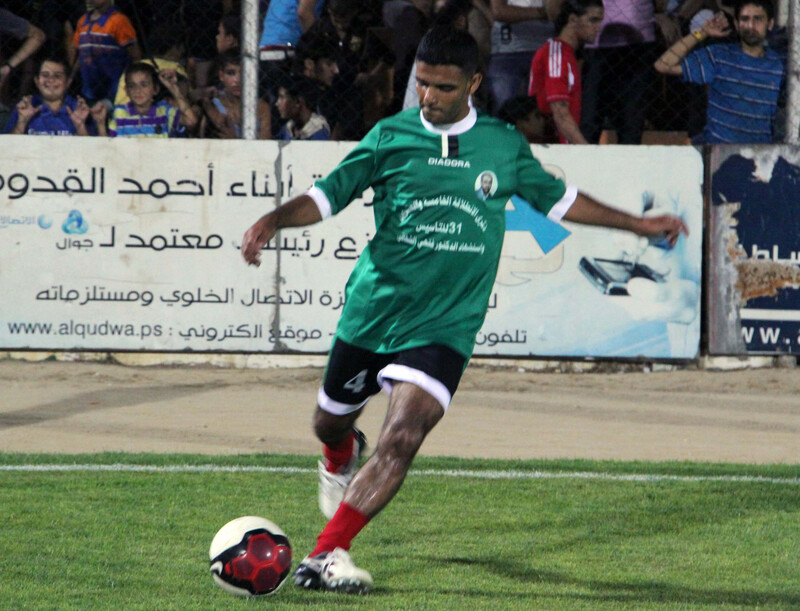Activism and BDS Beat 19 March 2013

Mahmoud Sarsak led a successful hunger strike against Israeli detention.
APA imagesThis month, former French sports minister Marie-George Buffet raised her voice, asking European football’s governing body to cancel its plan to hold this year’s under-21 championship in Israel.
Buffet wrote to UEFA president Michel Platini saying that Israeli restrictions on freedom of movement for Palestinian athletes, and the groundless incarceration of football players of the Palestinian national teams, “are incompatible with the sport values that should be respected when organizing a major international competition.”
In one of the most famous examples, Israel detained Palestinian national football team member Mahmoud Sarsak for three years without charge or trial and without visits from his family.
He was released after a three-month hunger strike in protest of his detention. Sarsak was 22 when he was arrested. Palestinian rights organization Addameer reported the grave impact of the hunger strike on Sarsak’s health.
Zakaria Issa, one of the Palestinian national team’s top strikers, was sentenced to 16 years imprisonment in February 2003. After being diagnosed with terminal cancer, he was released in August 2011, reported Maan News Agency. But on 1 February 2012, Issa passed away — only four months after his release.
Detention of striker Muhammad Nimr
Addameer wrote a profile of Muhammad Nimr, a talented 23-year-old striker from Amari refugee camp near Ramallah. The unpublished profile (in Arabic) was emailed to me in January, and a professional translated it into English.
Muhammad Nimr was born on 14 January 1990, is married and has a one-year-old son called Adam. At the time of his latest arrest on 18 February 2012, he was a member of al-Khader (St. George) Sports Club in Bethlehem, on loan from Amari Youth Centre’s team. He had been an outstanding member of the Palestine National Youth Football Team.
Addameer writes:
Muhammad was arrested on 18 February 2012 by the Israeli occupation army at 2 am. Some 70 soldiers took over the whole of the house and its surroundings. The group of young men arrested on the same day in the camp included Omar Abu Roïs, the goalkeeper of the Palestinian Olympic team.
He was taken straight to Ofer prison near Ramallah and transferred several hours later to al-Moskobiyeh investigation centre in occupied Jerusalem [The Russian Compound]. Two days after his arrest, a large number of occupation soldiers turned up again at his home in Amari refugee camp, accompanied by police dogs. His family were forced to leave the house and wait in the yard. After spending two hours inspecting and devastating the house, demolishing the doors, the furniture and the electrical equipment, the soldiers left.
The interrogation of Muhammad at the al-Moskobiyeh centre continued for more than thirty days. He was then taken to Ofer prison and charges were filed against him. The judicial proceedings against him lasted for several months and he was finally sentenced to 14 months imprisonment, a fine of 10,000 shekels and a 12-month sentence suspended for three years.
Nimr had first been selected as a professional member of the Palestinian National Youth Team in 2003, writes Addameer: “He played in many international matches and championships and was one of the most outstanding young athletes. He obtained many awards and played, for example, in Qatar, Iran and Norway. He was the top player in the championship in Norway.”
When he was only 17 years old, Nimr was arrested at the Container Checkpoint in Bethlehem district.
He was heading with his team to al-Khader Stadium for a spring championship match organized by al-Khader Club. During his detention, from 7 September 2007 to 12 April 2009, Nimr “was moved around from prison to prison: HaSharon Prison, Ashbal Prison, Ofer Prison.” He was cut off from all sports. “His imprisonment weakened his physique and undermined his experience and skills in the field. He left the Palestinian national team on being released from prison.”
I asked Baha Hilo to speak with the president of al-Khader Sports Club, Khalil al-Ammouri, to discuss the impact of Nimr’s latest detention on the club.
On Monday, Hilo wrote that al-Ammouri explained that Muhammad Nimr was the best player al-Khader had, its top scorer. His arrest destroyed the club’s hopes to qualify for the top level of the league and resulted in an enormous financial loss of 600,000 shekels ($162,450).
Nimr’s release is expected soon, but it is doubtful if he can return to his previous level of football, writes Hilo.
Campaign against Israeli football racism
In February, Unicef released a report about the ill-treatment of Palestinian children [PDF] held in Israeli military detention. Unicef reports that children are arrested by heavily armed soldiers at their homes at midnight or early in the morning while they are still asleep. They are blindfolded and their hands are handcuffed with plastic ties.
Physical and verbal abuse takes place during transfer to an interrogation site, including the use of painful restraints, lack of access to water, food, toilet facilities and medical care. Interrogators use physical violence and threats to coerce confessions. Furthermore, children have a lack of access to lawyers or family members during interrogation.
United Nations High Commisioner for Human Rights Navi Pillay highlighted the ill-treatment of child detainees in her presentation to the Human Rights Council on 18 March, citing the Unicef report.
Meanwhile, the campaign against Israel’s hosting of the 2013 European Under-21 football championship continues.
The European “Red Card Israeli Racism” campaign is organizing a major protest at UEFA’s Annual Congress in London on 24 May. The campaign will escalate its activities when the under-21 championship draws near. Information about the campaign can be found on the Boycott Israel Network website.
You can also support the campaign by signing the Red Card petition.





